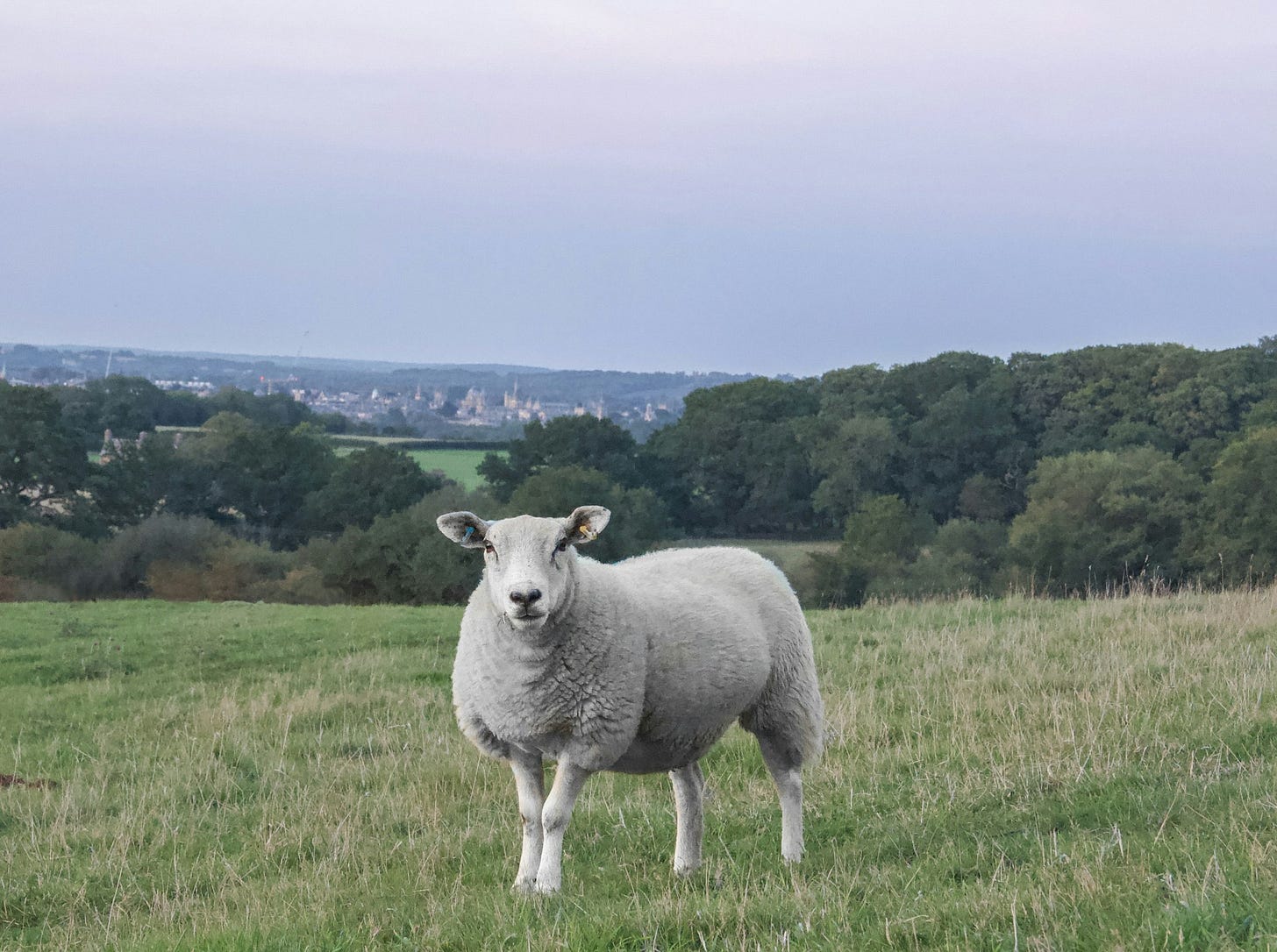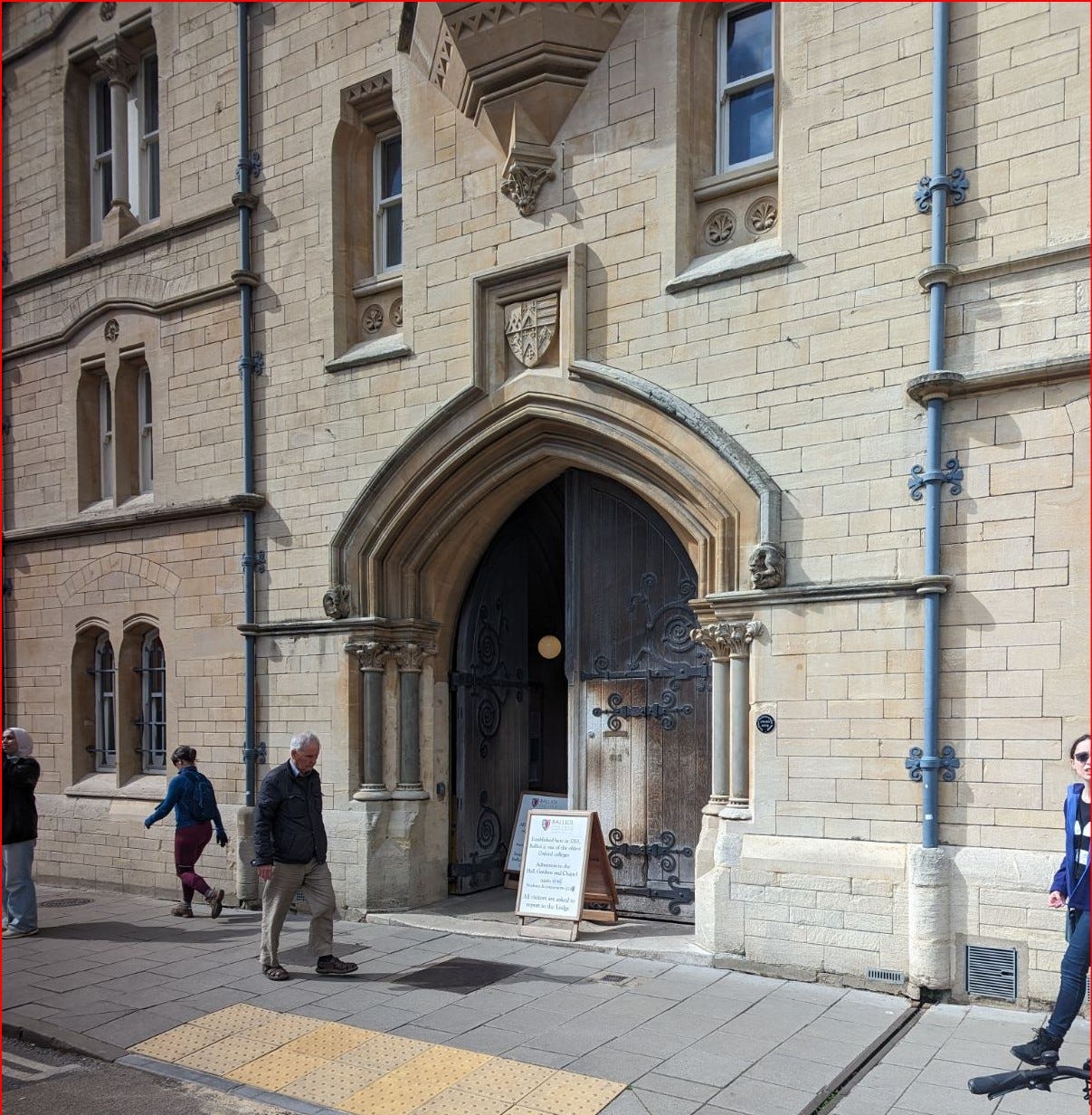While Rach, Boze, Daniel and I are getting our sea legs here on Substack—poking about with the text editor, sussing out the backend settings, and moseying around the more “social” areas of this extraordinary online think tank—and while we’re all making our way through the first twelve books of The Iliad for The Great Books Challenge—we thought it might be worth exploring what sort of mischief we “Fellows” of Biblioll College propose to get up to.
First, the Name
For at least some of our readers (fans of classic Nineteenth Century English novels), our title may sound at least vaguely familiar.
“Biblioll College” is, of course, not a “real world” academic institution…unless you have suddenly found yourself in the fantasy universe of Cornelia Funke’s Inkheart, where such dangerous activities as reading aloud (or listening to an especially gifted audiobook reader) can cause characters and objects from the book’s fictional world to manifest in our own. (Think Rhonda Byrne’s The Secret, on steroids.)
In which case, you must have been reading Thomas Hardy’s Jude the Obscure, for it is in the world of Hardy’s Wessex where “Biblioll College” first appears.
Hardy’s Tragic Jude
Hardy’s Jude Fawley is a working-class orphan, raised by a crusty old aunt, who comes of age in the rural “Wessex” (southwest England) of the 1830s. Inspired by a schoolteacher, and in spite of his poverty and lowly station, Jude yearns with all his soul to study at nearby Christminster, an obvious stand-in for Oxford, whose dreaming spires he can sometimes see, if the fickle English weather cooperates, from the roof of a local barn called “the Brown House”:

In sad wet seasons, though he knew it must rain at Christminster too, he could hardly believe that it rained so drearily there. Whenever he could get away from the confines of the hamlet for an hour or two, which was not often, he would steal off to the Brown House on the hill and strain his eyes persistently; sometimes to be rewarded by the sight of a dome or spire, at other times by a little smoke, which in his estimate had some of the mysticism of incense.
To fulfill his scholarly ambition, young Jude gives himself over to a decade of self-directed learning, especially of Greek and Latin grammar by way of old books collected on the cheap. Throughout these long years, his yearning for Christminster (Oxford, and all it represents) never wanes. For him, it is…
“…a city of light,” he said to himself. “The tree of knowledge grows there,” he added a few steps further on. “It is a place that teachers of men spring from and go to.” “It is what you may call a castle, manned by scholarship and religion.” After this figure he was silent a long while, till he added: “It would just suit me.”
Without giving away the farm—did I mention this novel is a tragedy? It’s Hardy, after all—Jude never fulfills his longing. He never makes it to Christminster, at least as a student—only as a workman, a stonemason who ever feels himself an outsider looking in, invisible to the young scholars he knows to be his equals in quality of mind.
It was not till now, when he found himself actually on the spot of his enthusiasm, that Jude perceived how far away from the object of that enthusiasm he really was. Only a wall divided him from those happy young contemporaries of his with whom he shared a common mental life; men who had nothing to do from morning till night but to read, mark, learn, and inwardly digest. Only a wall— but what a wall! Every day, every hour, as he went in search of labour, he saw them going and coming also, rubbed shoulders with them, heard their voices, marked their movements. The conversation of some of the more thoughtful among them seemed oftentimes, owing to his long and persistent preparation for this place, to be peculiarly akin to his own thoughts. Yet he was as far from them as if he had been at the antipodes. Of course he was. He was a young workman in a white blouse, and with stone-dust in the creases of his clothes; and in passing him they did not even see him, or hear him, rather saw through him as through a pane of glass at their familiars beyond.

Desperate to find a way into the world he worships, Jude:
…accordingly placed himself in such positions about the city as would afford him glimpses of several of the most distinguished among the Provosts, Wardens, and other Heads of Houses; and from those he ultimately selected five whose physiognomies seemed to say to him that they were appreciative and far-seeing men. To these five he addressed letters, briefly stating his difficulties, and asking their opinion on his stranded situation.
To these five letters Jude receives but one reply:
…it bore the embossed stamp of one of the Colleges whose heads he had addressed. “One—at last!” cried Jude.
The communication was brief, and not exactly what he had expected; though it really was from the Master in person. It ran thus:
“BIBLIOLL COLLEGE.
“Sir,—I have read your letter with interest; and, judging from your description of yourself as a working-man, I venture to think that you will have a much better chance of success in life by remaining in your own sphere and sticking to your trade than by adopting any other course. That, therefore, is what I advise you to do.
“Yours faithfully,
“T. TETUPHENAY.
“To Mr. J. Fawley, Stone-mason.”
“Biblioll College” is commonly believed to be a pseudonym for Balliol, one of the oldest of Oxford’s thirty-nine colleges. As a “fictional” college, we’ve taken the liberty of pinching its august name, with its ever so lovely bookish connotations, to stand in for our mutual longing, as lifelong learners without any particularly notable academic credentials—or any credentials at all—for what places like Oxford represent in our imaginations: hallowed halls of Wisdom and the pursuit of Truth, Goodness, and Beauty, almost a millennia old, that have nurtured some of the most influential thinkers, artists, and writers in the English-speaking world: William of Ockham, John Wycliffe, Erasmus, St. Thomas More, John Taverner, Sir Philip Sidney, Sir Frances Bacon, John Locke, Christopher Wren, Samuel Johnson, Edmund Burke, P.B. Shelley, St. John Henry Newman, Horace Walpole, Matthew Arnold, John Ruskin, A.W. Pugin, William Morris, Edward Burne Jones, J.M.W. Turner, John Everett Millais, Lewis Carroll, Oscar Wilde, T.E. Lawrence, Edward Elgar, J.R.R. Tolkien, Owen Barfield, Dorothy Sayers, C.S. Lewis, John Rutter, Stephen Hawking, Iris Murdoch, Elizabeth Anscombe, Mary Beard, and Zadie Smith.

(An aside: Like Jude, Daniel and I did try to “get into” Balliol last Spring, though just for a look-round; but every time we passed by the college there was a signboard in front of the Porter’s Lodge to the effect that the college was, ahem, closed to visitors. We’ll be in Oxford again this Spring, posting Dispatches, and will give Balliol another go.)
The Big Question
So like Hardy’s Jude, we Fellows of Biblioll College, whether for lack of time or money or for reasons of family responsibilities, or because we were born with unsuitable temperaments, never made it to Oxford, either, in anything but imagination. But unlike Jude, we haven’t given way way to despair, or abandoned the pursuit of learning, however it may be got, whether by Hook or by Crook.
Above all, even at the worst of times (no doubt by the grace of God, knock on wood), we Fellows of Biblioll have not given way to Jude’s (and possibly Hardy’s) existential hopelessness and pessimism—not just about the life of the mind, but about Life itself. Which is why, perhaps, reading Hardy always reminds me of a story about Einstein, who, upon being asked what Big Question he would most like answered, reportedly responded, “Is the universe friendly?”
Jude’s universe was not friendly towards would-be scholars from the lower classes. Maybe times are just different now. Books are readily available and Academia, to be frank, has for any number of reasons lost some of its former luster. Whatever the case, we here at Biblioll, for whom our “College” has become an imaginary “castle, manned by scholarship and religion”, have chosen to soldier on, doing our day jobs and using our limited leftover time and resources to pursue spiritual and intellectual interests—above all deep reading—that we hope will sharpen our minds, broaden our understanding, and widen our hearts.
For us, the universe is not just benevolent, however crazy and chaotic and sometimes downright evil things look every time we flip on the news or scroll our feeds, but a glorious creation that, if we look hard and prayerfully enough, can begin to make some kind of sense, however, ultimately, mysterious.
And if it’s not…well, the life of the mind, especially the study of the Humanities, which is our passion, is doomed from the start. A breath of wind.
Vanity.
And so, preferring to operate on the more Pascalian assumption, we curl up in the corners with our cuppas and our cats, and crack open our books.





I delight in the comparison between the "fellows" of Biblioll College and Jude Fawley--yearning, glimpsing, aspiring . . . towards the dreaming spires of Oxford.
As you point out, we can live the life of the mind and spirit whatever our circumstances and Biblioll College represents that "space"--one that can be shared for mutual enjoyment and edification here on Substack.
Thanks to all who desire truth, goodness, and beauty for their own sake . . . wherever they are to be discovered and savored.
Thank you for creating this imaginary place for widening the lens!
This was such a lovely and informative post. I joined along with the Dickens club somewhere in the middle of The Pickwick Papers, and loved reading (but never commenting) through every book/post/comment that followed.
Thanks to you all for expanding my horizons even more. Now, back to Agamemnon... :)